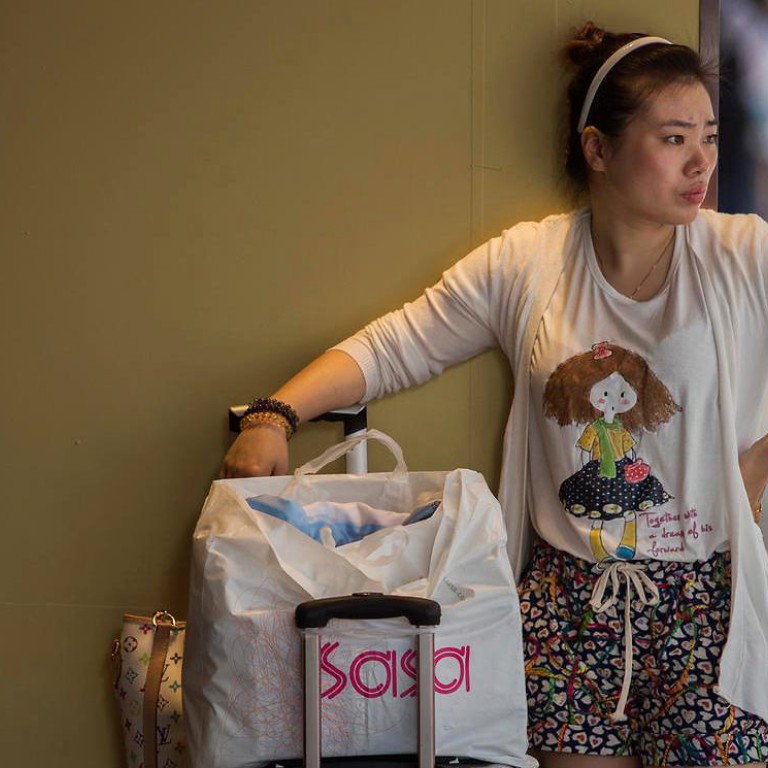
Mainland Chinese tourist boom sparking hotel conversions in Hong Kong's residential areas
Landlords seek to convert small shopping centres in non-core areas into inns amid an influx of short-stay mainland visitors
The influx of mainland tourists has made the landlords of small shopping centres in non-core parts of Hong Kong dreaming of bigger profits by converting them into hotels.
Previously, developers and investors would only consider developing hotel projects in traditional tourism or commercial districts. But small shopping centres in residential areas are now on their radar.
Alnwick Chan Chi-hing, the head of valuation and professional services at surveyor Knight Frank, said occupancy rates at shopping centres in less central areas were low.
We are seeing more conversions of older industrial buildings into lower-tier hotels
"The owners could generate a higher income if they convert the properties into hotels as there is a shortage of guest rooms in the city," Chan said.
Hutchison Whampoa has applied to the Town Planning Board for permission to convert the three-floor retail podium of the Hunghom Bay Centre's three residential blocks into a hotel with 86 rooms.
As the property is in a residential area, some distance from Hung Hom's main shopping area, the retail podium is currently occupied by offices. But it could attract tourists keen to stay at a hotel close to the Hung Hom train station and Tsim Sha Tsui.
Meanwhile, Barry Law Lam-wai, the former owner of real estate agency Ricacorp Properties, applied to convert the Tsui Chuk Commercial Centre, a small shopping centre in the Tsui Chuk Garden Home Ownership Scheme housing estate in Wong Tai Sin, into a 52-room hotel, but withdrew the application after residents objected.
And in Sham Tseng, Tsuen Wan, the lack of a railway connection has not stopped one landlord from thinking about developing a small hotel targeting mainland tourists. Chan Kee Restaurant has applied to redevelop its low-rise Chan Kee Plaza into a 22-storey hotel with 96 guest rooms.
"They are eyeing mainland tourists, who mainly look for a room for between HK$600 and HK$800 a day," Chan said.
"The occupancy rate of a shopping centre has to reach at least 70 per cent. Otherwise, it would be difficult to keep the tenants and attract shoppers.
"Many small shopping centres in non-core areas are facing the problem of high vacancy rates.
"Now, they could convert the property into a budget hotel targeting mainland tourists."
The Hong Kong Tourism Board says overnight visitor arrivals grew 8 per cent to 25.66 million last year, with those from the mainland jumping 13 per cent to 17.09 million.
"Hong Kong's market for overnight-stay inbound tourism has been increasing at a compound annual growth rate of 9 per cent since 2000," said Frank Sorgiovanni, a vice-president of research and strategic advisory at Jones Lang LaSalle's hotels and hospitality group.
"The supply of hotels, on the other hand, has lagged the growth of the market.
"Over the past five years, the supply of hotels has grown 29 per cent while overnight-stay visitor arrivals have increased 48 per cent."
The government forecast that total visitor arrivals could exceed 70 million by 2017 and 100 million by 2023.
Sorgiovanni said there was demand for more rooms in the market, but his company had discovered that mainlanders tended to pay about half the industry room rate.
"This is where the opportunity lies and also why we are seeing more conversions of older industrial buildings into lower-tier hotels to meet this room demand," he said.
However, William Cheng Kai-man, the chairman of Magnificent Estates, a hotel developer and operator targeting the mid-range and economy market, warned against such moves because of the high costs involved in developing and operating a hotel, adding that they were expected to be "highly non-rewarding".
"For example, if we generate an income of HK$100 from the hotel business, our net income is HK$60 only," Cheng said.
"Your operating and back-up teams have to reach a certain scale even if the hotel has fewer than 100 rooms. Otherwise, your hotel cannot function.
"As the operation cost is high, a small hotel could generate a net income of HK$20 to HK$30 only. That's why only newcomers to the hotel industry would convert small shopping centres into hotels.
"It is true that the occupancy rate of hotels has remained at a high level and that overnight visitor arrivals increased last year. But the average spending on accommodation has declined. The market outlook is not really promising."

